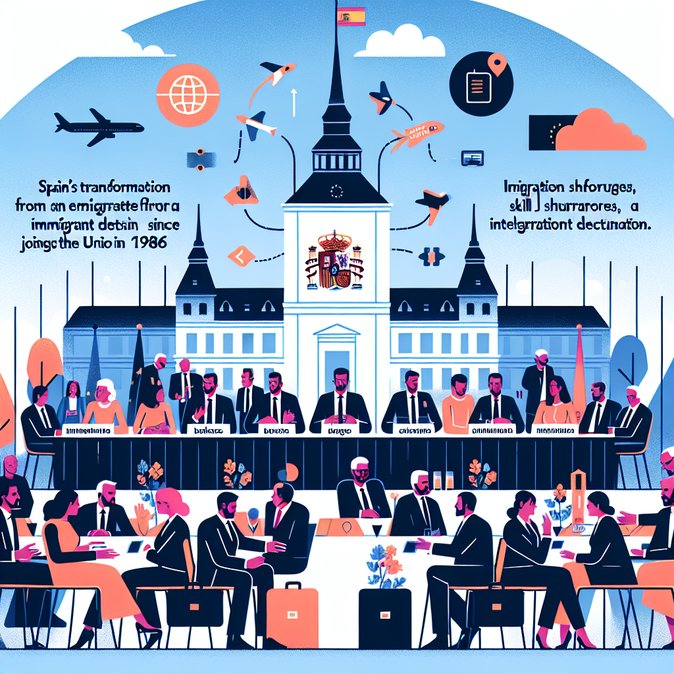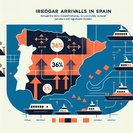
On 5 November the European Migration Network (EMN) convened officials, academics and corporate mobility managers at Madrid’s Museo Reina Sofía to reflect on four decades of Spain inside the European Union—and how that journey has reshaped the country’s approach to borders, labour migration and integration.
Opening the conference, State Secretary for Migration María José Garrido noted that Spain has moved from being a country of emigration in the 1980s to one of Europe’s top destinations today. EU membership, she argued, provided the legal and financial scaffolding—Schengen accession, Frontex cooperation, structural funds—that made this transition possible. Panels examined topics ranging from digital border management and the upcoming Entry/Exit System (EES) roll-out, to the role of regional governments in social inclusion.
Corporate speakers emphasised practical pain points. HR heads from two IBEX-35 companies cited uneven processing times between provinces and urged the Interior Ministry to publish standard service-level agreements before the EES goes live in April 2026. Start-ups praised the 2023 Start-ups Act for creating a digital-nomad visa but called for clearer guidance on family-member work rights.
![Madrid conference marks 40 years of EU membership and Spain’s migration-policy transformation]()
NGOs used the forum to highlight gaps: only 35 % of asylum-seekers currently access language training within six months of arrival; women face employment rates 12 percentage points below men. Responding, government representatives said the forthcoming Intercultural Integration and Coexistence Plan—now in public consultation—will ring-fence €120 million for language, mentoring and skills-validation projects.
For mobility professionals the take-away is twofold. First, EU-level initiatives (EES, ETIAS) will increasingly dictate timelines and documentation requirements for short-term assignees—companies should audit travel-policy compliance now. Second, Spain’s internal decentralisation means regional stakeholders matter: engaging local employment services and chambers of commerce can accelerate onboarding of foreign staff.
EMN Spain announced that proceedings and policy recommendations will be published in early 2026—valuable reading for anyone shaping mobility strategy in the Iberian market.
Opening the conference, State Secretary for Migration María José Garrido noted that Spain has moved from being a country of emigration in the 1980s to one of Europe’s top destinations today. EU membership, she argued, provided the legal and financial scaffolding—Schengen accession, Frontex cooperation, structural funds—that made this transition possible. Panels examined topics ranging from digital border management and the upcoming Entry/Exit System (EES) roll-out, to the role of regional governments in social inclusion.
Corporate speakers emphasised practical pain points. HR heads from two IBEX-35 companies cited uneven processing times between provinces and urged the Interior Ministry to publish standard service-level agreements before the EES goes live in April 2026. Start-ups praised the 2023 Start-ups Act for creating a digital-nomad visa but called for clearer guidance on family-member work rights.

NGOs used the forum to highlight gaps: only 35 % of asylum-seekers currently access language training within six months of arrival; women face employment rates 12 percentage points below men. Responding, government representatives said the forthcoming Intercultural Integration and Coexistence Plan—now in public consultation—will ring-fence €120 million for language, mentoring and skills-validation projects.
For mobility professionals the take-away is twofold. First, EU-level initiatives (EES, ETIAS) will increasingly dictate timelines and documentation requirements for short-term assignees—companies should audit travel-policy compliance now. Second, Spain’s internal decentralisation means regional stakeholders matter: engaging local employment services and chambers of commerce can accelerate onboarding of foreign staff.
EMN Spain announced that proceedings and policy recommendations will be published in early 2026—valuable reading for anyone shaping mobility strategy in the Iberian market.










